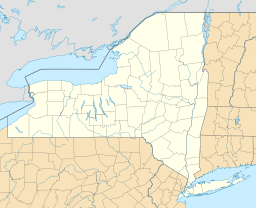Buck Pond (Nehasane Lake, New York) facts for kids
Quick facts for kids Buck Pond |
|
|---|---|
| Location | Herkimer County, New York |
| Coordinates | 43°58′06″N 74°50′32″W / 43.9682199°N 74.8423559°W |
| Surface elevation | 1,841 feet (561 m) |
| Settlements | Keepawa |
Buck Pond is a small, peaceful lake found north of the hamlet of Keepawa. This charming body of water is located in Herkimer County, New York. It's an important part of the local natural landscape.
Buck Pond's water flows out towards the southeast. This happens through a small, unnamed creek. This creek eventually joins Alder Creek, which is a larger waterway in the area.
Contents
What is Buck Pond?
Buck Pond is a natural lake. It is not very big, making it a "pond" rather than a large "lake." Ponds are usually shallower and smaller than lakes. They often have plants growing all the way across their bottom.
Where is Buck Pond Located?
Buck Pond is nestled in Herkimer County, New York. This county is in the central part of New York State. The pond is quite close to the small community of Keepawa. Its location means it's part of the beautiful natural areas of New York.
How Does Water Move Through Buck Pond?
Water enters and leaves Buck Pond in a natural cycle. The pond drains to the southeast. This means water flows out in that direction. It leaves the pond through a small stream that doesn't have a specific name. This stream is important because it connects Buck Pond to other water systems.
Connection to Alder Creek
The unnamed creek that flows from Buck Pond eventually reaches Alder Creek. Alder Creek is a larger stream or river. This connection shows how all water bodies are linked. Water from Buck Pond becomes part of a bigger network. This network eventually flows into larger rivers and even oceans.
Why are Ponds Like Buck Pond Important?
Small lakes and ponds, like Buck Pond, are very important for nature. They provide homes for many different plants and animals. They also help keep the local environment healthy.
Homes for Wildlife
Ponds are like natural neighborhoods for wildlife. Many kinds of fish live in ponds. Frogs, turtles, and insects also make their homes there. Birds often visit ponds to find food and water. The plants around and in the pond offer shelter and food.
Water for the Environment
Ponds help to store water. This can be important during dry times. They also help to filter water naturally. This means they can clean the water as it passes through. This helps keep the surrounding land healthy.
Natural Beauty and Recreation
Ponds add to the beauty of the landscape. They offer peaceful places for people to visit. While Buck Pond is a small, quiet lake, many ponds are used for activities. These can include fishing, boating, or simply enjoying nature.
Interesting Facts About Ponds
- Ponds are usually less than 15 feet deep. This allows sunlight to reach the bottom.
- The temperature of a pond can change a lot. This happens from the top to the bottom. It also changes from day to night.
- Ponds can be formed in many ways. Some are made by glaciers. Others are formed by rivers changing course. Some are even made by animals like beavers.
- Ponds are often home to tiny living things. These are called plankton. Plankton are a food source for many small fish.


